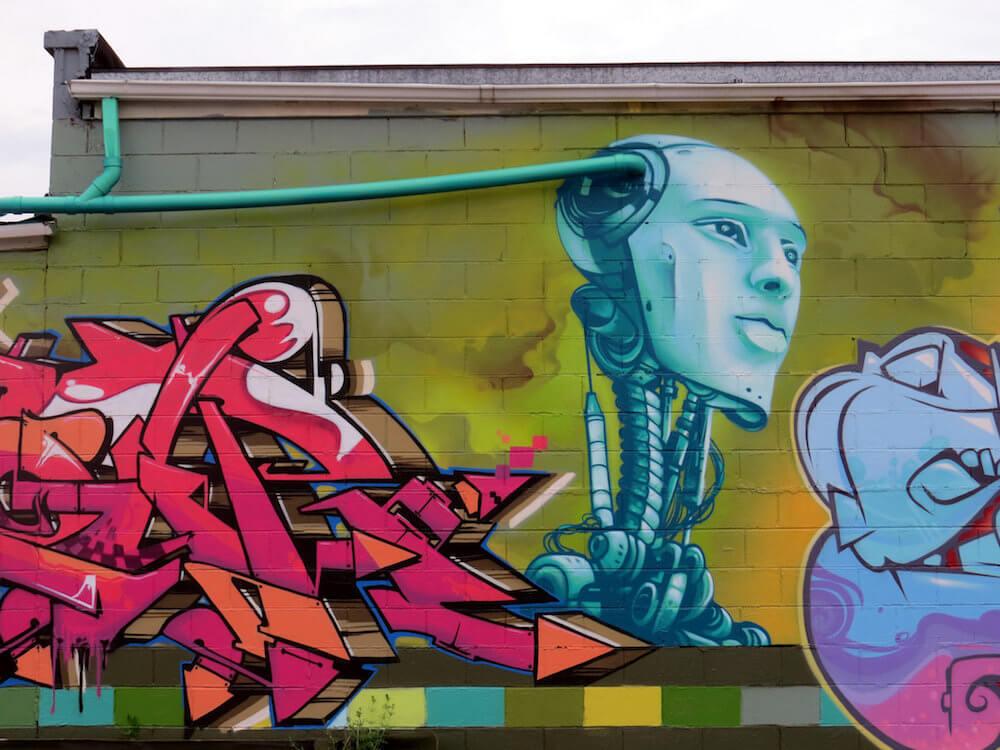"Friday format": AI - a new enemy or a new god

/ photo PROSteve Baker CC
One of the traditions of the IT-GRAD team is the Friday analysis of what is happening in the world of technology and science. For example, in the “Friday format” series of posts, we considered the applicability of IaaS in the scientific community ( part 1 and part 2 ).
')
Today we decided not to stop there and talk about AI.
Artificial intelligence has reached another level of development - Google AlphaGo defeated the Korean grandmaster in the game of Go. Is it reaching? After all, machines have long dominated the professionals in solving intellectual problems - 19 years ago the computer Deep Blue surpassed Garry Kasparov in chess, and in 2005 the AI Watson won the game show “Jeopardy!” (A prototype of “His game”).
But Go - the game is more complicated. If you familiarize yourself with it, it becomes clear that, calculating possible moves, you won’t be able to win - in order to defeat the world champion, the car needs to learn to “think” creatively, improvise and adjust to the situation. To win the go, it was necessary to create an advanced, truly creative artificial intelligence.
Computer technology is developing exponentially - experts compare the intellectual capabilities of modern computers with mouse abilities, despite the fact that several years ago they were at the level of insects. This fact is alarming, because sooner or later the development of computers will lead to their intellectual superiority over people.
Stephen Hawking and historian Yuval Harari are building negative scenarios for further developments, Ray Kurzweil rubs his hands in anticipation of eternal life in the information field, and writer and entrepreneur Mark Manson urges not to cause panic. What will “flirting” with the development of technology for mankind?
Platform War
Computers can not only play board games and participate in game shows. Ten years ago, people laughed at the low productivity of self-driving cars. Today, unmanned cars drive not only on a closed highway, but also on a highway loaded with vehicles driven by people.
A few years ago, it was extremely expensive to recognize faces using software, and in practice programs did not identify people very accurately. Such technologies were considered super-developed spy toys and were used only by the governments of several countries. Now Facebook can just pick up your friends from a recent party.
And here you can listen to music written and performed by the neural network. An inexperienced listener is able to attribute authorship to, if not Mozart, then to one of the contemporary composers.
The rapid development of technology forces the largest IT-companies, such as Amazon, Google, IBM and Microsoft, to take active measures to become the best in the development of AI. As IT industry experts put it, companies entered the “platform war”.
A platform in the IT sphere is called a software product, on the basis of which other companies write programs, and without which regular users cannot do. A company with its own platform guarantees a large profit.
IBM is taking the most active part in the development of artificial intelligence platforms. Launched in early 2014 as a subsidiary of IBM, Watson is engaged in both software development and the provision of various services. Therefore, the technology of this project is optimized for specific industries.
More than 80 thousand developers have already downloaded and tested the software products of Watson, which cooperates with 500 industry partners, including both large companies and startups. For example, the startup Ross Intelligence has developed on the basis of the AI Watson a robot legal assistant.
“This is just the beginning, and in the long run, we want hundreds of millions of people to use Watson as an intelligent self-service service,” said Watson general manager David Kenny.
In 2015, Amazon and Microsoft introduced machine learning capabilities into their cloud platforms — Amazon Web Services and Microsoft Azure. Companies use machine learning algorithms to help customers identify patterns and make predictions based on large amounts of data.
Microsoft offers 18 services using machine learning, including facial recognition, text analysis and product recommendations. At the end of May, as analysts predicted, Microsoft demonstrated even greater prospects in working with AI at a developer conference in San Francisco.
Google reveals its plans for working with AI technologies in an attempt to attract the attention of developers. In November, the company introduced the open source TensorFlow machine learning technology, which is used by its employees.
In May, at a conference in San Francisco, Google boasted a new service for converting speech to text. The company also talked about how it implements an image processing system, which will soon be available for mass use. Google also introduced new tools and tutorials that will simplify application development with machine learning elements.
According to IDC, by 2020, the market for applications using machine learning algorithms will reach $ 40 billion. At the same time, 60% of these applications, according to IDC representatives, will be implemented on the platforms of four companies - Amazon, Google, IBM and Microsoft.
According to scientist Jeff Dean (Jeff Dean), who oversees the development of Google’s AI solution, “intelligent” applications will become commonplace, “and machine learning will affect every industry.” Developing the most advanced AI technology for a company means leadership in the IT industry for years to come.
“Whoever wins this race will dominate the next stage of the information technology century,” said Pedro Domingos, an expert in machine learning and the author of The Master Algorithm, which describes how AI and Big Data technologies will change the world.

/ photo Miranda Granche CC
What's on Siri's mind
According to The Guardian, a new book by historian Yuval Harari, whose books are recommended for reading by Bill Gates himself, “Homo Sapiens: A Brief History of the Future” (Homo Sapiens: A Brief History of Tomorrow) contains rather gloomy forecasts. He admits that artificial intelligence can make some people look like gods and predicts the emergence of a “class of useless people” who cannot catch up with computers and their more successful and enterprising kinsmen in development.
One day, the day will come when we will create a computer that will be “smarter” than any person on Earth. Then computers will start using us as a means to solve their problems, and our thoughts, decisions and actions will gradually become unnecessary. Will people then have a reason for living, a reason to wake up in the morning?
Many key figures of modern science and business also hold pessimistic views. Bill Gates, Stephen Hawking and Ilon Musk are just a few of the leading thinkers and scientists who are surprised at how quickly AI is developing and how much the human race is not ready for the consequences of this development.
When Ilona Mask was asked what they were afraid of in the near future, he said without hesitation that there were three threats: the first was a global nuclear war, the second was climate change. Before calling the third, he paused. When a journalist asked him what the third threat was, he smiled and said: "In short, I hope that computers will treat us well."
Hope for boot loader for digital superintelligence. Unfortunately, that is increasingly probable
- Elon Musk (@elonmusk) August 3, 2014
Recording of Ilona Mask on Twitter: “I hope we will not be just a mechanism for launching a digital superintelligence. Unfortunately, this outcome is becoming more likely. ”
Perhaps the most outspoken and respected technological armageddonist is the Swedish philosopher Nick Bostrom. One of the fears of Bostrom and his supporters is the emergence of uncontrolledly self-improving technology - a machine that is so “smart” that it can make itself, or new versions of itself, even more intelligent without human intervention.
If it reaches a level that exceeds human intelligence, then, according to the law of accelerating returns, the launch of exponential technology development is just a matter of time, and we will not be able to stop this process. Bostrom makes an important note here: the creation of superintelligence, which is smarter than us, can destroy the entire human race.
Some are waiting for the uprising of cars with impatience, as they believe that their superpowers to solve problems so much surpass ours that life will become incredibly happy and free from problems. All diseases will be cured. Poverty, hunger, war and environmental problems will disappear. We all will have endless free time, and in a certain scenario, as some people believe, machines will make us immortal.
Ray Kurzweil , for example, claims that technology will not only improve our lives, but also be able to save us and, perhaps, guarantee us a place in the universe for an indefinite period. He believes that the technologies of the future - for example, nanorobots - will be able to restore our cells, reverse the aging process and remove excess fats and sugar from the body so that we can eat whatever we want. In the event that our physical bodies will not exist forever, as Kurzweil believes, we will be able to unload our consciousness into the “cloud” and live in the virtual world even after our bodies disappear.
Kurzweil and his supporters believe that technology has no reason to harm humanity, since they are not just created by us, but are increasingly becoming a part of ourselves. Kurzweil supporters suggest that the moment will come when the line between biology and technology will be barely noticeable. In this case, any technology that causes harm to a person at the same time will cause harm to itself, and any auto-destructive technology will not be able to survive for long. Therefore, it will "die out" as quickly as a harmful mutation, which is excluded from the gene pool.
Other supporters of technological utopia suggest that artificial super-intelligence could answer questions that a person cannot even understand. Thanks to this, the standard of living in the world will grow exponentially. In addition, machines will not just invent more advanced devices: they will come up with faster and more efficient methods for creating these devices, thanks to which almost all living things will be able to reap the fruits of their labors.
It turns out that supporters of the development of AI deify him, they expect only mercy from him and hardly guess that instead of them a terrible judgment can await them. While utopians and Armageddonists argue, entrepreneur and writer Mark Manson looks at the problem indifferently, believing that computers will have a high level of morality and will try to make the life of people sweet and carefree.
And if they need to destroy people, they will choose the path of least resistance, they will allow mankind to self-destruct, only by directing their actions to the “right” course. What does he think about enslaving computers? Overly happy slaves never riot.
In any case, the statements of optimists, pessimists, indifferentists and other representatives of the human race are just guesses. What machines plan to do with humanity, surpassing its development, is known only to them. And they are unlikely to reveal their plans to people. If you ask, for example, Siri, if the robots take over the world, she will answer: "It doesn't matter what I think." And when asked about the emergence of a class of useless people, you will receive an evasive answer: “And this after all I've done for you?”.
Source: https://habr.com/ru/post/304660/
All Articles